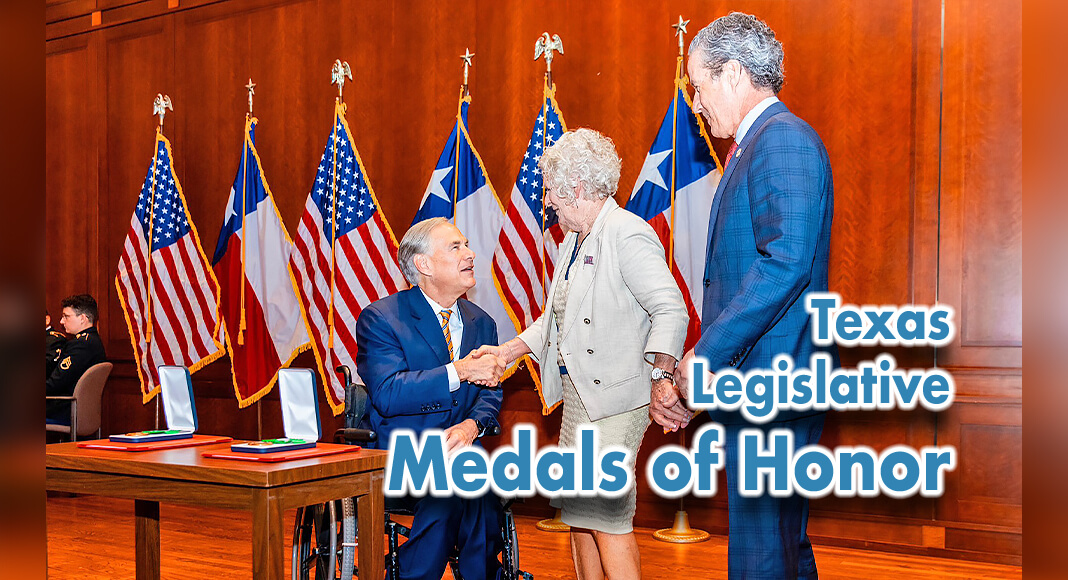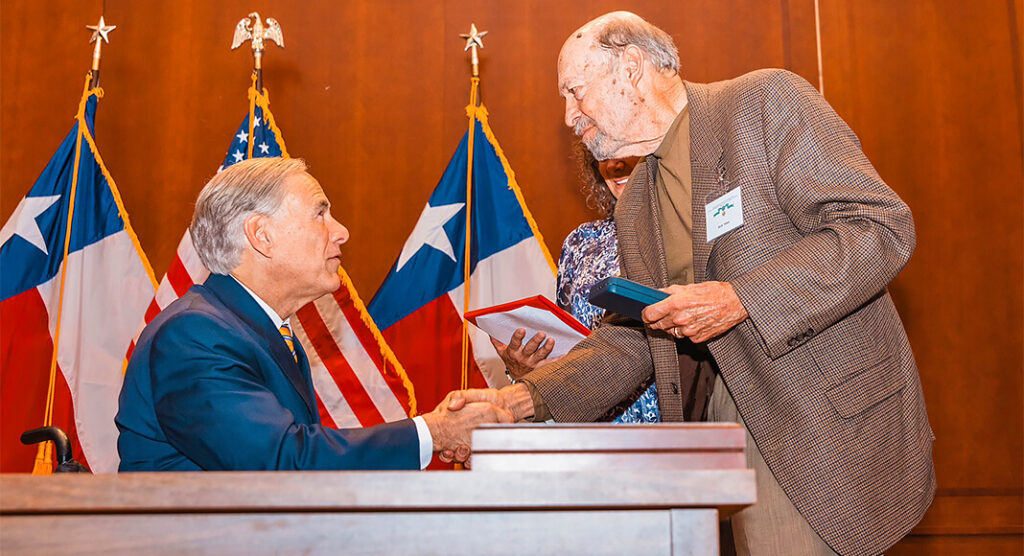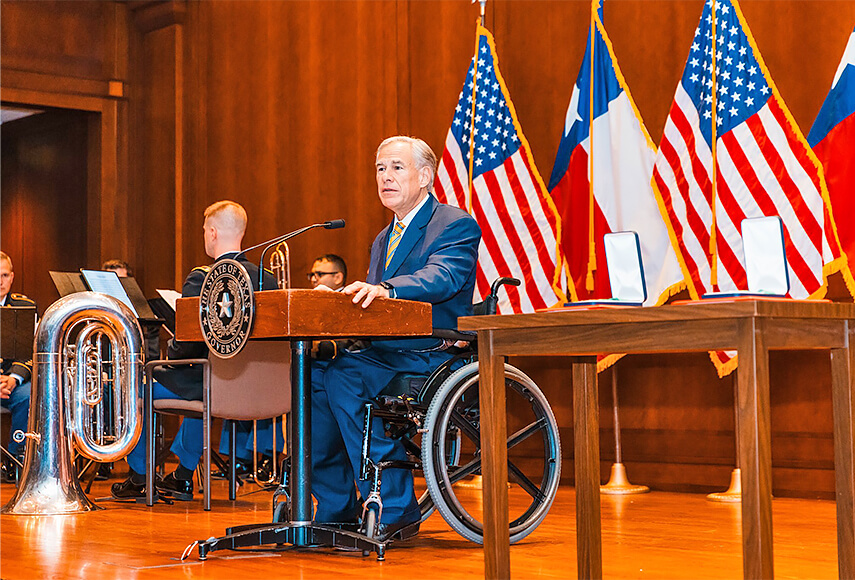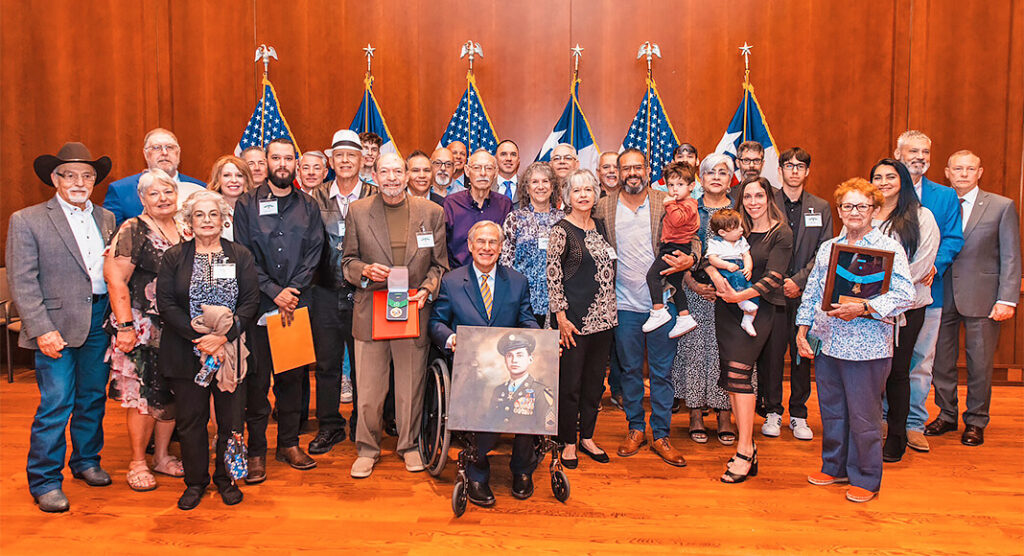
Texas Border Business
AUSTIN, Texas – Governor Greg Abbott today posthumously presented the Texas Legislative Medal of Honor to U.S. Army Sergeant Major Jerry Lynn Bell and U.S. Master Sergeant Mike Peña during a ceremony at the Texas Capitol. The Texas Legislative Medal of Honor is the highest military decoration conferred to a service member of the Texas military forces.

“Today, we honor two men who raised their hand and answered the call for our country,” said Governor Abbott. “Each of these men continued a tradition of heroism that extends back to the very dawn of this great nation. These brave service members showed that despite all of the division America has endured, there are still selfless souls willing to put down their civilian lives and put on the uniform of the United States to safeguard our freedom. We will never forget the sacrifices both Sergeant Major Bell and Master Sergeant Peña made for our country, and today we honor them for their heroic efforts.”

Senator Kelly Hancock nominated U.S. Army Sergeant Major Bell and Representative Terry Wilson nominated U.S. Master Sergeant Peña for the Texas Legislative Medal of Honor.
U.S. Army Sergeant Major Bell was recognized for his valiant service during the Vietnam War, and U.S. Master Sergeant Peña was recognized for his service in World War II and giving his life to save his fellow soldiers during the Korean War. The awards were accepted by members of Sergeant Major Bell and Master Sergeant Peña’s respective families.

The Governor was also joined at the ceremony by Representative Cecil Bell, Representative Carrie Issac, Representative Stan Kitzman, Adjutant General of Texas Major General Thomas Suelzer, and other service members.
U.S. Army Sergeant Major Bell was born in Leon County and as a fourth generation Texan, he enlisted in the U.S. Army in Houston. After distinguishing himself as a tank commander, he was assigned from May 1969 to June 1970 as a non-aviator crew member with Troop B, 7th Armored Squadron, 17th Air Cavalry, in Vietnam. On February 25, 1970, Sergeant Bell took part in a mission in which an accompanying helicopter was shot down, severely injuring its crew. Exposed to intense fire while his aircraft advanced toward the crash site at treetop level, Sergeant Bell suffered shrapnel wounds to his left arm and chest but kept the enemy at bay by firing on their position with his machine gun. His efforts provided cover to facilitate a rescue of the aviators in the downed craft, and he also assisted by keeping his helicopter’s rotor clear of obstacles and tending to injured crew members on the ground. After the wounded were evacuated for medical treatment, he and the pilot returned to the combat zone and marked the enemy fortifications so that they could be targeted by gunships, artillery, and air strikes. Sergeant Bell received numerous commendations, including to the Purple Heart for his shrapnel wounds, the Distinguished Flying Cross, the Army Commendation Medal, the Bronze Star with “V” device, multiple Air Medals, the Vietnam Service Medal with four bronze service stars, the Meritorious Service Medal with one oak leaf cluster, and the Republic of Vietnam Gallantry Cross with palm ribbon. This dedicated soldier ultimately completed 21 years of active duty in the armed forces, attaining the rank of sergeant major, and he was posted to Germany and Korea, among other locations. After retiring from the military, he served as a postal carrier in Leon County, worked for a construction company, operated a gun store, and successfully ran for mayor of Leona.
U.S. Master Sergeant Peña was born in 1924 to Mexican immigrants Miguel and Maria Peña. In 1940, he enlisted in the army in Houston after misrepresenting his age to recruiters and was assigned to the 5th Cavalry Regiment, 1st Cavalry Division. Deployed to the Pacific theater in 1943, Sergeant Peña fought to liberate the Philippines from Japanese forces and later took part in the occupation of Japan during World War II. He received an honorable discharge on October 3, 1945, and reenlisted the same day. In late June 1950, the U.S. military was again called upon when soldiers from communist North Korea invaded South Korea. Sergeant Peña volunteered to return to action, rejoining the 5th Cavalry Regiment, and he participated in an amphibious landing at P’ohang-dong, Korea, in July 1950. On September 4, 1950, Sergeant Peña and his platoon were posted near Waegwan, when a North Korean Army battalion emerged only yards away. The platoon opened fire but was caught off guard by the attack and was forced to withdraw. Sergeant Peña rallied his troops and led them in a counterattack that succeeded in regaining their lost ground. Sergeant Peña and his men then established a defensive perimeter and attempted to repel the North Koreans’ repeated assaults, but the enemy had a numerical advantage. When the platoon’s ammunition supply dwindled, Sergeant Peña commanded his men to fall back and seized a machine gun to provide cover for the retreating troops. Making a heroic stand, he held back the enemy singlehandedly until the early morning hours, when his position was overrun, and he was fatally wounded at the age of 25. He was buried with full military honors at Cedarvale Cemetery in Bay City. The outstanding service that Sergeant Peña rendered over the course of his military career brought him more than 30 decorations and awards, including the Distinguished Service Cross, the Bronze Star, the Purple Heart with two oak leaf clusters, the Army Good Conduct Medal with bronze clasp and two loops, and the Congressional Medal of Honor at a White House ceremony on March 18, 2014, for his heroism in Korea.













